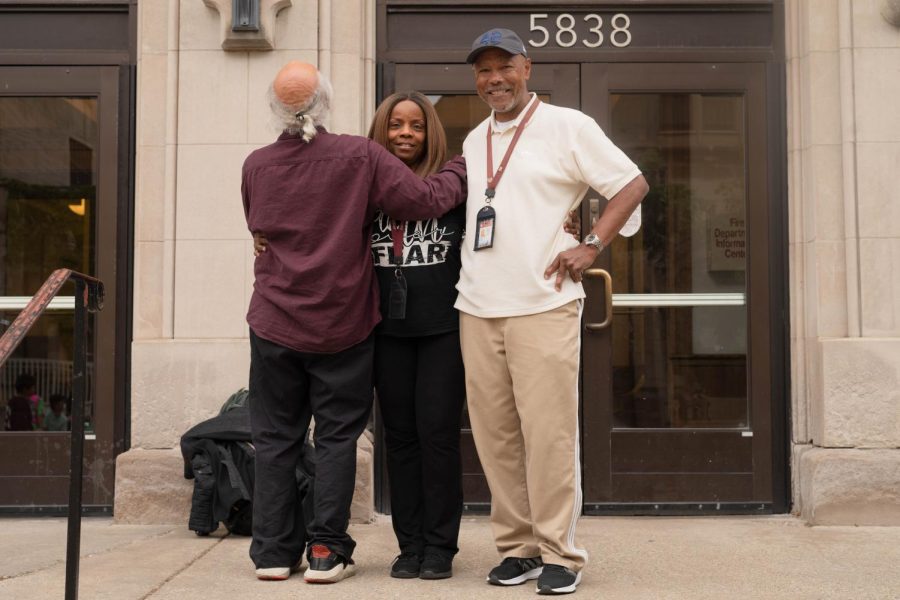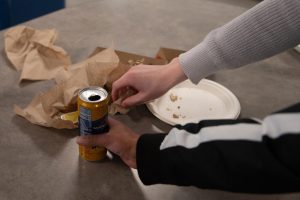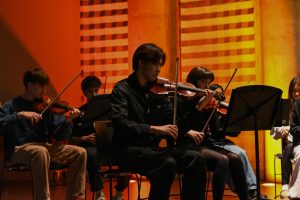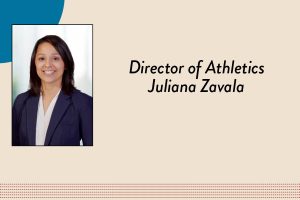Other cherished faces will retire
Henry
CARING COMMUNITIES. Phillip Matsikas (who insisted on being photographed from the back), Loretta Palmer and Michael Moses will retire at the end of the year after decades of facilitating welcoming communities.
May 26, 2023
Philip Matsikas
Matskias inspired students through nurturing artist, building independence
Forty years ago, a friend of a friend called Mr. Matsikas about a job opening at the school where she worked. A lower school art teacher had just quit with little notice. Mr. Matsikas got the job, beginning an iconic legacy of art education at Lab.
“It was the planets lining up,” he said.
In the years that followed, Mr. Matsikas became known for a robust style of training lower school students in portrait making, painting and studying some of the world’s most famous artists.
“I’ve been very dedicated to my students’ education, to the sense of — and this is very Dewey — going out into society,” he said. He added later, “At some point, between early childhood and adolescence, students need to develop all sorts of skills of resilience, persistence and grit.”
One aspect of Lab that especially inspired Mr. Matsikas was its value of the core ideas of John Dewey about teaching and learning. In particular, Mr. Matsikas appreciated the tenet of empowering students and giving them control over their learning.
“There was an intellectual piece that totally grabbed me,” Mr. Matsikas said. “How do you educate human beings through the vehicle of fine arts? And that’s basically what I’ve been working on for 40 years.”
Mr. Matsikas especially finds his purpose when a student’s artwork is complete.
He said, “When a student’s face reflects the pride of going beyond what they knew they could do before they started. When they get to that rite of passage at the end of a project. Like, ‘Oh, I can do this.’”
Michael Moses
Moses created community, made space for students to express their identities
Mr. Moses, himself a Lab alumnus, has spent his career teaching physical education at Lab. He began working as a substitute teacher for Lab P.E. classes in 1989, and later took over for a retiring teacher.
Mr. Moses said part of his experience in teaching P.E. for so many years has been recognizing the different levels of athleticism and acknowledging all students’ progress.
“Having kids feel comfortable with aspects of P.E. recreation that they might not feel comfortable doing,” he said, “and when the unit is over, they have a higher level of confidence because they’ve had levels of success in that particular class.”
Every season, Mr. Moses takes members of the soccer team to help a non-profit organization, America Scores, serving public schools on the West Side. He sees participation in sports as a way to give back to the community and engage with younger athletes from different backgrounds.
“To me it resonates with the value of the experience — there’s more to sports and athletics,” Mr. Moses said. “To be a part of community building, helping kids in situations that are different than Lab school kids are.”
Helping students form their identities through sports is something Mr. Moses has tried to incorporate into his teaching. He believes the sense of accomplishment students take away from each short unit in P.E. will help in the long run.
“Yes, it’s P.E., but there’s more aspects to it that might help students in the future,” Mr. Moses said, “Say they want to go out in college and play Ultimate Frisbee, they would have had that experience. Maybe they don’t throw the Frisbee all that well, but there’s this sense of identity: maybe I can do it again.”
Loretta Palmer
Palmer hopes Lab will keep, continue to prioritize respectful community
Ms. Palmer came to Lab as an administrator in the lower school office 26 years ago. She formerly worked in telecommunications at the University of Chicago, yet Ms. Palmer felt Lab was the place she was supposed to be.
“I was very excited about coming here,” Ms. Palmer said. “I took a look around and saw the kids, I love the kids. So I knew it was the perfect place for me. I felt it in my spirit.”
When Ms. Palmer’s brother died in 2000, she saw the heart of the Lab community.
“Everyone was very compassionate about our loss, and we had colleagues show up at the funeral and just show their support and love and their condolences,” she said. “That made me feel very included in the Lab family.”
Ms. Palmer has seen the school change dramatically since she first arrived. She said she has seen a shift, in particular, when it comes to the experiences of people of color. Ms. Palmer said she wonders if current students and community members have the level of support they once had.
Above all, Ms. Palmer said she doesn’t want Lab ever to lose its central philosophy on the importance of community.
“We don’t want to lose focus on the importance of being a family and being supportive to each other,” Ms. Palmer said.
Ms. Palmer would like to add a fourth rule onto the lower school’s often mentioned “Rules of the Road.”
“The Lab School has a saying where they say, ‘Be kind, be thoughtful, be responsible,’” Ms. Palmer said. “I’d like to add onto that legacy to ‘be respectful,’ as well,” she said, “so we as a community can get along and respect one another.”
Ranjana Patnaik is also retiring this year after working at the high school library for 25 years.




























































